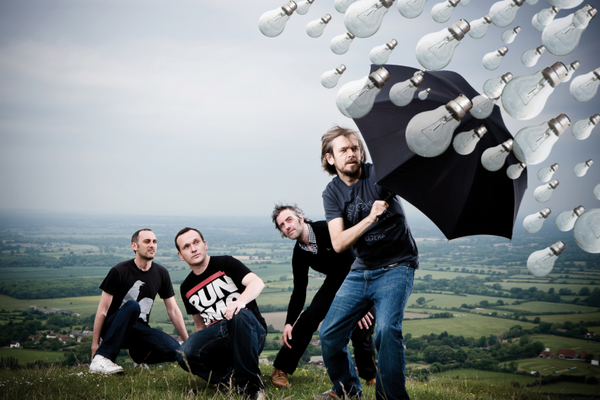
CONTACT
Fujiya & Miyagi
Fujiya & Miyagi, the masked technicians of sound, dissect music to create a pulsating antidote to the ordinary. Their infectious pop, a blend of Krautrock, Italo-disco-funk and lyrical originality, creates a unique niche in modern music - an infectious journey of fragmented images and sublime anecdotes.
Imagine Fujiya & Miyagi are masked technicians who want to dissect music and magnify sound particles to create a pulsating antidote to the ordinary. They speak in tongues, use language as rhythm, choose words that sound good, rhyme "jigsaws" with "carnivores."
The Fall, The Human League and Momus rub shoulders with each other..... Fujiya & Miyagi may draw comparisons to Hot Chip in their indie disco feel, but Lightbulbs stumbles upon dark fantasy in its own way - Mojo
Their songs are pithy snapshots of real life that make household appliances sound menacing. They are steeped in classical music, from moody krautrock to deep soul, with hints of early Human League synths, Floydian Englishness and the pulsating groove of Tom Tom Club, all filtered for modern times.
All in all, Fujiya & Miyagi don't really sound like anything. Instead, they sound like everything, condensed into perfectly arranged three-minute chunks of infectious pop music, a strange mix of James Brown on Valium and Wire gone Pop. Or maybe Serge Gainsbourg with a PhD in electronics, backed by David Byrne's Eno-produced scratchy guitar, mixed by MF Doom. This is crazy Darwinism.
Formed in 2000 as an electronic duo of David Best (guitar and vocals) and Steve Lewis (synths, beats, programming), two years later they released Electro Karaoke In The Negative Style, a minimal electronic set eerily carried by Best's distinctive whispered vocals. With bassist Matt Hainsby joining in 2004, they released a series of ten-inch EPs that won them the hearts of their fanbase. These parables of personal wounds, both physical and psychological, formed three-quarters of Transparent Things, released in 2006 and praised by Pitchfork, NME, MOJO, etc. Named after a Nabokov-esque brainwashing about the relationship between past and present, that sums them up.
Their smooth Italo-disco funk is a particularly welcome development, and the oscillating organ is reminiscent of Radiohead in the pop-style - hard to resist - Guardian.
The 12-inch "Uh" further thickened their sound. With a series of vocals, a funky bass and a story about a relationship as prickly as two porcupines, it made small talk sound sinister over an infectious groove. It was the perfect lead-up to their first proper album, Lightbulbs - imagine 11 classic ideas clacking over your head, now with real drums in places, courtesy of Lee Adams, and the picture is complete.
Fujiya & Miyagi steer clear of lyrical themes that have been covered to death. They use vintage synths to underscore their beautifully observed anecdotes about romantic triumphs and disasters, heroes and villains and the world in general, and their rhythms tap out to create modern symphonies like no one else can. Lightbulbs is a journey full of fragmented images, anecdotes from the sublime to the ridiculous, blurry stories that were better left unheard. Each track is an aural contamination that will make your inner ear itch every waking moment.
F&M have added fascinating textures to the Krautrock of Transparent Things (2006): from the power ballad of the title track to the underlying menace of Dishwasher - Observer Music Monthly
"I'll never be Big Maybelle," says David Best of his unique singing style. True, but as the frontman of a band that draws inspiration from its evolution, that plunders the past but is set in the future, Fujiya & Miyagi's Light Bulbs carve out a niche of their own. This is truly infectious music, a very unique take on modern pop music that is entirely their own.

